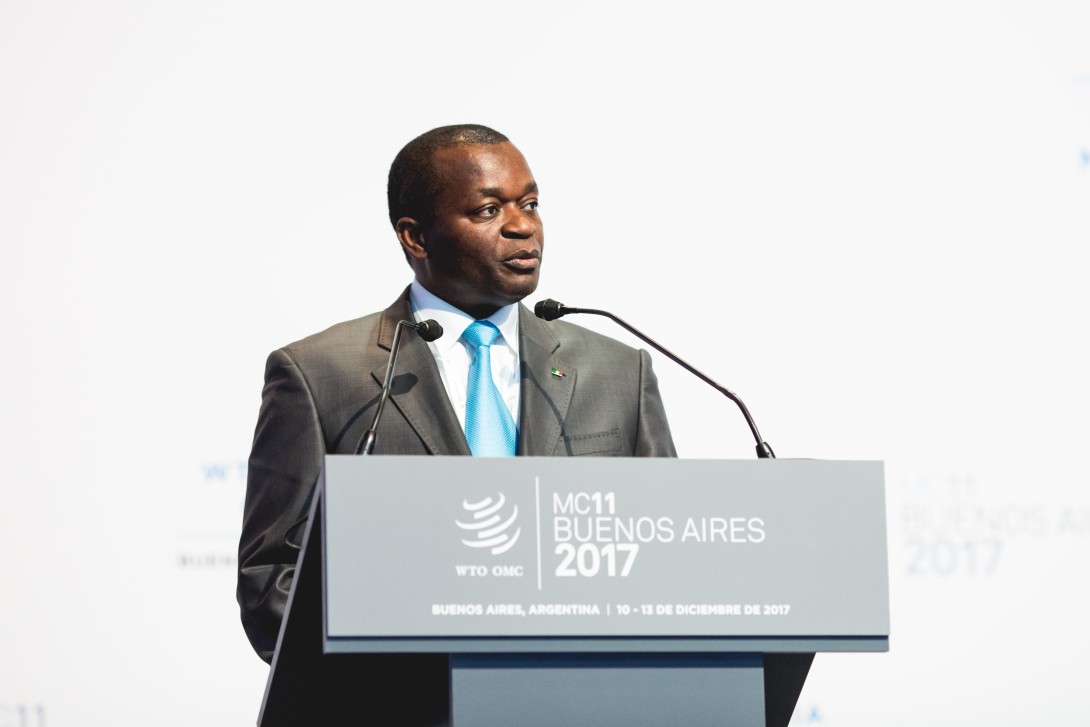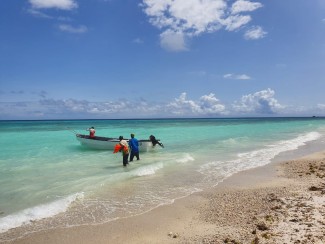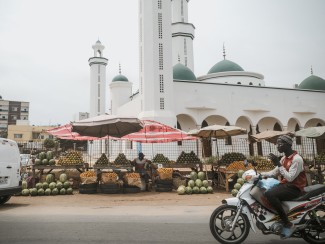Bridges Africa met with Alioune Sarr, the Senegalese Minister for Trade, Consumer Affairs, the Informal Sector, and Small and Medium-Sized Enterprises, to discuss ecommerce and related policy priorities for Senegal and Africa.
Originally published in BRIDGES AFRICA VOLUME 7 - NUMBER 2
Ecommerce is radically transforming the global economy. On a practical level, what are the barriers that are still curbing its growth on the African continent and that need to be overcome?
Ecommerce is growing rapidly in almost all the world's regions. According to the United Nations Conference on Trade Development (UNCTAD), global ecommerce sales reached US$25.3 trillion in 2015.[1] In Africa, although forecasts for growth are positive, with a growth rate that should increase from 2.2 percent in 2013 to 2.5 percent in 2018, ecommerce is still dominated by a handful of countries, including Egypt (US$3.9 billion), Ethiopia (US$0.06 billion), Ghana (US$0.09 billion), and South Africa (US$1.2 billion).[2]
The challenges with which African countries are faced in the context of ecommerce – and which hinder its development – are multifaceted. They are linked among others with infrastructure (including problems related to access to electricity, information technologies, and communication and logistics); the reliability of ecommerce platforms (implementing security measures for IT solutions and certifying these platforms); the low level of use of electronic payment methods (a penetration rate of banking services estimated at approximately 24.7 percent in African countries,[3] low usage of credit cards due to the low purchasing power, underdeveloped financial system, prevalence of cash transactions, etc.); the nascent legal framework in this area (certain aspects of ecommerce are rarely taken into account by the legal framework, in particular when it comes to the protection of personal data and privacy as well as intellectual property and the fight against cybercrime); alignment with international legal instruments (lack of effectiveness when it comes to enforcing legal texts, etc); the lack of IT knowledge and skills related to ecommerce from companies as well as consumers (critical mass of human resources that is still insufficient, limited capability of R&D, etc); as well as the lack of national policies and strategies on ecommerce.
You have previously emphasised the fact that Senegal needs a “proper policy” on ecommerce. Is this already being developed? What are your government's objectives in this area?
Senegal has ecommerce sites (approximately 60) in various sectors, electronic payment methods (Paydunya, Orange money, Wari, Joni-Joni, Poste-cash, etc.), logistics and delivery services (Rapidos, Tiak-Tiak, Carrapide, etc.), and a legal and institutional framework for ecommerce. It therefore fulfils a large amount of the conditions necessary for the development of ecommerce, but does not have a policy on this topic with a clear vision, strategy, and action plan that combine all the dimensions or fields related to ecommerce.
The fourth pillar of the “Digital Senegal 2016-2025” strategy calls for the diffusion of digital tools and solutions in key economic sectors, including ecommerce. In this area, planned actions include updating the relevant legal framework, setting up interoperability conditions among electronic financial services platforms, launching a programme to promote electronic financial services, and launching a programme to support the creation of ecommerce sites with a focus on local products and offering the possibility of electronic payment.
In order to handle the ecommerce dimension of the implementation of the "Digital Senegal 2016-2025" strategy, my department has been working on designing a coherent policy for ecommerce. As a result, in addition to the existing institutional framework, a national consultative framework was set up on 26 January 2017 to create a synergy of actions. It brings together players from the public sector, the private sector, and civil society that are involved in ecommerce.
Furthermore, my department has submitted a project on designing a National Ecommerce Development Strategy to the Executive Secretariat of the Enhanced Integrated Framework (EIF). This project, the implementation of which is planned for April 2018, will enable us to carry out an in-depth diagnosis of ecommerce in Senegal, identify clear actions to roll out in order to develop ecommerce on a national level, and leverage opportunities on an international level, while also building a statistical database.
Ecommerce is often presented as an area that is particularly promising for women's economic empowerment. In your opinion, how can this potential be best utilised to generate economic opportunities for African women, in particular Senegalese women?
According to the International Labour Organization (ILO), only one third of all the companies in the world are run by women. Most of the companies run by women are micro and small-sized businesses with limited potential, in particular in developing and transition countries. According to the results of a survey conducted by the Global Entrepreneurship Monitor in 2015, the rate of entrepreneurial activity among women in Senegal was 36.8 percent, compared to 40.5 percent for men.
Through the opportunities offered by ecommerce, combined with its rapid development, significant economic opportunities can be generated, in particular for women, by reducing transaction costs, simplifying the access of women (entrepreneurs, craftswomen, product manufacturers, and processors) to domestic and international markets, strengthening the efficiency and competitiveness of micro and small-sized enterprises, and removing constraints on supply capabilities for business-to-consumer trade, which does not need to send products in large quantities.
To help women benefit more from ecommerce, we need a strong political will to:
- Increase the training of women in the use of information and communication technologies,
- Prioritise development areas, in particular digital entrepreneurial projects by women,
- Increase women's access to digital economy resources and opportunities,
- Lower the gender digital divide

Although strong national policies are, of course, essential, developing ecommerce in Africa will require a certain level of cross-border alignment. What is the role of regional integration in this area? What are the efforts that have been made within ECOWAS?
Indeed, cross-border ecommerce cannot develop without efforts to align policies, in particular on a regional level, to avoid the existing asymmetries between markets. The drive for alignment may even come from goods and services providers, in order to lower the cost of compliance and increase the legal security of electronic transactions, but it may also come from human rights defenders focusing on the protection of intellectual property, privacy, and consumers.
This is why, within the West African Economic and Monetary Union (WAEMU), work is being carried out with the support of the EIF programme to diagnose the e-commerce sector’s needs and build a development strategy for this area. In the first stage, Burkina Faso and Togo have been selected.
On the level of the Economic Community of West African States (ECOWAS), community rules on electronic transactions, cybercrime, and the protection of personal data have been developed, respectively through Supplementary Act A/SA.2/01/10, Directive 1/08/11, and Supplementary Act A/SA.1/01/10.
Despite these alignment efforts, there are still many challenges ahead. These include transposing and operationalising texts at the level of member states, in addition to popularising them and raising the awareness of stakeholders (consumers, public and private sectors, civil society).
The member states of the African Union are also currently negotiating the African Continental Free Trade Area. Ecommerce has not yet been included in the topics being negotiated, but it could be added during the second stage of the negotiations. Do you think that this should be the case?
The African Continental Free Trade Area, for which negotiations were launched by heads of state and government of the African Union in June 2015, provides for the liberalisation of trade and investment on the continent. The first stage of the negotiations, which started on 22 February 2016, deals with trade in goods and services, whereas the second stage will focus on competitiveness, investment, intellectual property, and the movement of natural persons (people travelling on business).
Ecommerce has not been explicitly included in the negotiation topics for the CFTA. However, if it is not included in the second stage of negotiations, the issue could be dealt with as part of the negotiations on trade in services. Indeed, the development of ecommerce relies on the development of certain service sectors such as computer and related services, communication services (telecommunications, postal services, etc), and financial services (electronic payment methods).
As president of NEPAD, Senegal will once again be invited to the G20 summit this year. Is your government planning to use this opportunity to make sure that Africa's priorities for ecommerce are properly taken into account?
The G20 summit is a very high-level meeting of the most influential countries in the world. As usual, Senegal will leverage its invitation to the G20 to bring the concerns of developing countries to the attention of these leaders, in particular regarding multilateral negotiations.
During the next meeting, which will take place in Buenos Aires, Argentina, the issue of ecommerce, as well as priorities of developing countries such as agriculture, fishing, and special and differential treatment will be raised. This will in particular include discussing with the members of the G20 the issues faced by developing countries and how developed countries could help solve them.
You were responsible for facilitating discussions on ecommerce during the last WTO ministerial conference. According to you, what is the WTO's role in this area? Is Senegal open to new discussions, and potentially new rules, on this topic?
The WTO's role is to further discussions among its members and formulate multilateral rules that can adequately cover international commerce in the field of ecommerce.
Since 1998, there has been a work programme to help frame discussions on this topic within the organisation. The issues raised relate to the classification of digitised products among services (GATS) or goods (GATT); the trade treatment of software delivered electronically; cloud computing; restrictions that impact the free movement of data, in particularly regarding data localisation, encryption and security; the guarantee of access to and use of Internet networks and services for service suppliers; protecting personal data, confidentiality, and consumers; intellectual property in the context of ecommerce; and the implications of ecommerce for development, among others.
The WTO could help encourage transparency as well as the sharing of experiences when it comes to policies. It could also help promote lowering or eliminating unnecessary barriers to ecommerce and improving market access, while developing technical assistance and capacity-building for developing countries, in particular LDCs. Removing the constraints with which LDCs are faced would help encourage them to participate more fully in international ecommerce.
In light of the divergent views expressed by members at the last WTO ministerial conference, as facilitator of the discussions on ecommerce I believe that it would be a wise move to continue the work carried out through the Work Programme on Electronic Commerce, on the basis of the existing mandate, until the next ministerial in 2019. This work could then be taken forward within the relevant bodies of the WTO, namely the Council for Trade in Goods, the Council for Trade in Services, the TRIPS Council, and the Committee on Trade and Development.
Despite its interest in productive discussions on ecommerce, Senegal, for its part, does not wish to see new rules in this area, given the current state of things, but strongly supports continuing work on a multilateral level.
Generally, the future of multilateral trade talks is still very much in doubt today. Given the situation, what should the priorities of African countries be when it comes to trade policy?
African countries would benefit more by strengthening the integration of their markets, both on a regional and continental level, so as to be better integrate global value chains and to improve their share in international trade.
However, issues of particular interest for our countries on a multilateral level must continue to receive special attention until favourable, concrete results have been obtained. This includes issues related to cotton, special and differential treatment, and agriculture.
Interview conducted on March 8, 2018
[1] UNCTAD. “Maximizing the development gains from e-commerce and the digital economy.” Note by the Secretariat, 26 July 2017.
[2] UNCTAD. Information Economy Report 2015 – Unlocking the Potential of E-commerce for Developing Countries. Geneva: UNCTAD, 2015.
[3] Bempong Nyantaky, Eugène and Mouhamadou Sy. “Banking System in Africa: Main Facts and Challenges.” Africa Economic Brief 6, Issue 5 (2015).
If you would like to reuse any material published here, please let us know by sending an email to EIF Communications: eifcommunications@wto.org.


